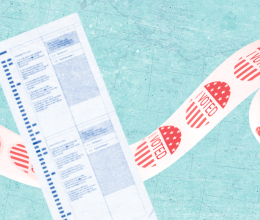COLUMBUS, OH–The ACLU of Ohio was disappointed by yesterday’s passage of House Bill 3 by the Ohio General Assembly. The bill, which would require voters to present a form of identification such as a driver’s license before casting a vote, would make it difficult for people without ID to vote and could cause confusion among voters as to what identification is acceptable.
ACLU of Ohio Staff Attorney Carrie Davis said, “Ohio does not have a documented problem with unregistered voters casting votes. However, the state has a wealth of problems with registered voters unable to cast their votes and having them counted.”
Davis went on, “House Bill 3 does not substantially address the many real difficulties Ohioans experience when casting their vote, and will only serve to further disenfranchise people who wish to participate in civic life but may not be able to provide identification.”
The bill was introduced eleven months ago and went through several revisions. It was passed out of a conference committee on January 19 by a vote of 4-2.
House Bill 3 has been the target of a great deal of public scrutiny from various organizations including the League of Women Voters and the NAACP. In addition to the identification provision, the bill has come under attack for generating more confusion by increasing the use of provisional ballots and restricting voter registration efforts at universities, fairs or festivals.
Many contend that the bill will be implemented too quickly. Governor Taft hurriedly signed the bill late Tuesday, allowing some of the provisions to go into effect by the May 2006 primary election. All aspects of the bill, including the voter ID provision will apply to the November 2006 general election.
Davis added, “House Bill 3 will make over 100 revisions to Ohio election law and will take boards of election a great deal of time to sort through all of the changes. Implementing them all by the November election could be disastrous for many trying to cast their vote in Ohio. ”





